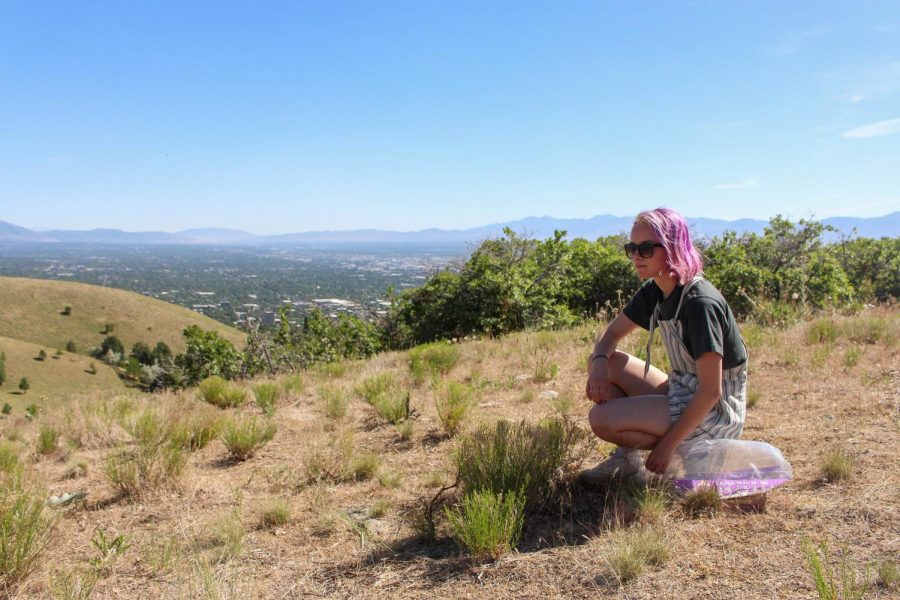Soter: Utah Needs More Than Prayer to Save Us from the Drought
University of Utah’s rising junior, Angeline Bourgeault, collects samples for her Field Botany class along the Bonneville Shoreline Trail in Salt Lake City on June 13, 2021. (Photo by Gwen Christopherson | The Daily Utah Chronicle)
June 16, 2021
On June 4, Utah made national headlines after Gov. Spencer Cox declared a Weekend of Prayer, encouraging his constituents to pray for rain to alleviate the state’s current drought. Cox’s ignorant claim that prayer would be a viable solution to the extreme drought has made our state the nation’s laughingstock.
But that same weekend, light rain showers did sprinkle the Salt Lake Valley, only reinforcing Cox’s inadequate and comical attempt at combatting the state’s severe water shortage. While Cox and his supporters saw the rain as the “divine intervention” they eagerly anticipated, I saw it as a mere coincidence. If Cox really wants to conserve water during this crisis, he must do more than request prayers.
Last summer, the Utah drought intensified, making for the driest summer ever recorded. Forecasts remained bleak during the winter. Considering that Utah receives 95% of its water from the annual snowpack, this lack of precipitation caused concern. And this year, Southern Utah’s snowpack is only 20% of what it should be. The water in major Utah reservoirs, which hold the majority of annual precipitation, also fell 15% from what they were at last year.
Now, the drought has impacted a jaw-dropping 2.7 million citizens statewide. Farmers, who use more than 80% of the state’s stored water, have felt the drought the most. Many farms have needed to sell livestock to cope. Northern Utah farms were told that they will only receive somewhere between 40%-50% of their average water allotment after crops were already planted. And since soil moisture is also at an all-time low, this season’s lack of water will be devastating to farmers, resulting in a major revenue losses for those in the agriculture industry.
Beyond these discouraging numbers, Utah is one of the fastest growing states in the nation, and many predict the population boom will continue increasing. We must solve the water crisis now by setting precautions and taking strict conservation actions. Otherwise, the state will not be able to maintain this population growth.
While state leaders have little control over the drought itself, they certainly have control over how we conserve our water moving forward — and currently, they haven’t done enough.
On March 17, Cox issued an executive order, stating that Utah was in a state of emergency because of the statewide drought conditions. The declaration will give agriculture workers and all other Utah citizens access to emergency resources to combat the drought. In the last months, Cox has repeatedly emphasized that citizens should take shorter showers and fix sink leaks while disregarding the fact that indoor residential use only makes up a mere 4% of Utah’s water usage.
Cox and his administration also encouraged citizens to “Slow the Flow,” a phrase coming from the campaign comprised of different community state partners and their passion to conserve water. The campaign’s website has helpful resources such as conservation tips, rebate programs and lawn watering guides.
But the website also provides a link to the state’s “Hall of Fame or Shame,” a tactic adopted from other drought-stricken areas. The site allows citizens to highlight their neighbors’ watering strategies – for better or for worse. The site has received criticism as it can inadvertently divide rather than unite communities in times of hardship, and arguably achieves little.
Thankfully, at a press conference on June 8, Cox declared that all state facilities reduce their outdoor watering to twice a week, and in Southern Utah, three times a week. While these actions stepped in the right direction, the Cox administration also made it clear that water conservation remains specific to counties and local governments. But the state has reached the point where acting on small local levels will no longer suffice. Instead, we need drastic, overarching actions statewide.
A good place for the state to start would be to imitate Nevada in banning rarely used grass areas from being watered, which could be anything from office parks to street medians. Water conservationists predict that this simple restriction will result in a 15% decrease in water consumption annually. Another positive solution would be for the state to invest in more water infrastructure to help better conserve water.
But perhaps the most promising solution would be removing water property taxes statewide. Currently, water taxes are subsidized, resulting in cheaper prices for individuals. If we removed property taxes on water, it would no longer be subsidized, resulting in higher water prices. Utahns would then be forced to understand water’s tangible value and be incentivized to conserve the water they do have.
I do believe in the power of prayer. People coming together in faith to fight for a common cause can have miraculous results, and I do not dismiss this. That said, I also believe in science. We can withstand this drought only if we rely on facts rather than faith. Together, we can conserve the little water we do have in an intentional way.









